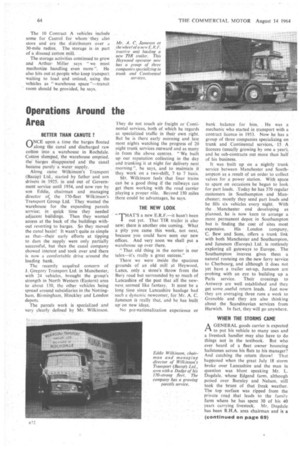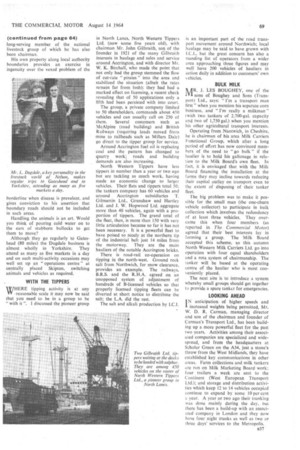Operations Around the Area
Page 66

Page 71

If you've noticed an error in this article please click here to report it so we can fix it.
BETTER THAN CANUTE ?
rINCE upon .a time the barges floated
along the canal and discharged raw cotton into a warehouse in Rochdale. Cotton slumped, the warehouse emptied, the barges disappeared and the canal became purely a water supply.
Along came Wilkinson's Transport (Bachp) Ltd., started by father and son drivers in 1925, in and out of Government service until 1954, and now run by son Eddie, chairman and managing director ot the 170-fleet Wilkinson's Transport Group Ltd. They wanted the warehouse for the expanding parcels service; in quick time they needed adjacent buildings. Then they wanted access at the back of the buildings without reverting to barges. So they moved the canal basin! It wasn't quite as simple as that—their early efforts at tipping to dam the supply were only partially successful, hut then the canal company showed interest and took over and there is now a comfortable drive around the loading bank.
The recently acquired concern of J. Gregory Transport Ltd. in Manchester, with 24 vehicles, brought the group's strength in North Western (Eastern) area to about 130, the other vehicles being spread around subsidiaries in the Nottingham, Birmingham, Hinckley and London depots.
The parcels work is specialized and very clearly defined by Mr. Wilkinson. They do not touch air freight or Continental services, both of which he regards as specialized traffic in their own right. But he is there early morning and late, most nights watching the progress of 20 night trunk services outward and as many in from the above centres. " We built up our reputation collecting in the day and trunking it at night for delivery next morning ", he says, and to maintain it they work on a two-shift, 7 to 7 basis.
Mr. Wilkinson feels that liner trains can be a good thing if the railways can get them working with the road carrier playing a proper role. Beyond 150 miles there could be advantages, he says.
THE NEW LOOK
" THAT'S a new E.R.F.—it hasn't been
out yet. That TIR trailer is also new; there is another one coming. What a pity you came this week, not next, because you could have seen our new offices. And very soon we shall put a warehouse up over there.
" That old thing in the corner is our telex—it's really a great success."
There we were inside the spacious grounds of an old mill at Heywood, Lanes, only a stone's throw from the Bury road but surrounded by so much of Lancashire of the past that all the newness, seemed like fantasy. It must be a lone time since Lancashire haulage had such a dynamic newcomer, for Mr. A. C. Jameson is really that, and he has built up on new ideas.
No pre-nationalization experience or
bank balance for him. He was a mechanic who started in transport with a contract licence in 1953. Now he has a group of three companies specializing on trunk and Continental services, 15 A licences (usually growing by one a year), and he sub-contracts out more than half of his business.
It was built up on a nightly trunk service between Manchester and Southampton as a result of an order, to collect valves for a power station. With space to spare on occasions he began to look for part loads. Today he has 370 regular customers in Southampton and Manchester; mostly they send part loads and he fills six vehicles every night. With the Manchester end developing as planned, he is now keen to arrange a more permanent depot in Southampton but is finding the cost of sites most expensive. His London company, C. Bew and Sons, offers a trunk link with both Manchester and Southampton, and Jameson (Europa) Ltd. is restlessly exploring all gateways to Europe. The Southampton interest gives them a natural routeing on the new ferry service to Cherbourg, and although it does not yet have a trailer set-up, Jameson are -probing with an eye to building up a Paris service. Their crossings to Antwerp are well established and they get some ,useful return loads. Just now they are averaging three runs a week to Grenoble and they are also thinking about the Scandinavian services from Harwich, in fact, they will go anywhere.
WHEN THE STORMS CAME
A GENERAL goods carrier is expected .1"-k to put his vehicle to many uses and a livestock handler may also have to do things not in the textbook. But who ever heard of a fleet owner' bouncing hailstones across his flats to his manager? And catching the return throw! That happened when the great July 18 storm broke over Lancashire and the man in question was blunt speaking Mr. L. Dugdale, whose Edgend farm, although poised over Burnley and Nelson, still took the brunt of that freak weather. The top surface was ripped from the private road that leads to the family farm where he has spent 30 of his 40 years carrying livestink. Mr. Dugdale has been R.H.A. area chairman and is a
(continued from page 84) long-serving member of the national livestock group of which he has also been chairman.
His own property along local authority boundaries provides an exercise in ingenuity over the vexed problem of the borderline when disease is prevalent, and gives conviction to his assertion that boundary roads should not be included in such areas.
Handling the animals is an art. Would you think of pouring cold water on to the ears of stubborn bullocks to get them to move?
Although they go regularly to Gateshead (80 miles) the Dugdale business is almost wholly in Yorkshire. They attend as many as five markets in a day and on such multi-activity occasions may well set up an "operations centre" at centrally placed Skipton, switching animals and vehicles as required.
WITH THE TIPPERS
WHERE tipping activity is at any V, -reasonable scale it may now be said that you need to be in a group to be "with it ". I discussed the pioneer group
in North Lanes, North Western Tippers Ltd. (now some five years old), with chairman Mr. John Gilbraith, son of the founder in 1921 of the many Gilbraith interests in haulage and sales and service around Accrington, and with director Mr. W. K. Birchall, who made the point that not only had the group stemmed the flow of cut-rate " pirates " into the area and stabilized the situation (albeit the rates remain far from lush); they had had a marked effect on licensing, a recent check revealing that of 50 applications only a fifth had been persisted with into court.
The group, a private company limited to 50 shareholders, commands about 450 vehicles and can usually call on 250 of them. Several customers such as McAlpine (road building) and British Railways (requiring loads moved from mine to railheads such as Millers Dale) go direct to the tipper group for service.
Around Accrington fuel oil is replacing coal and the pattern has changed to quarry work; roads and building demands are also increasing.
North Western Tippers have less tippers in number than a year or two ago but are tackling as much work, having made an economic change to larger vehicles. Their flats and tippers total 50; the tankers company has 60 vehicles and around Accrington subsidiaries T. Gilmartin Ltd., Grunshaw and Hartley Ltd. and J. W. Hopwood Ltd. aggregate more than 40 vehicles, again with a proportion of tippers. The grand total of the fleet, then, is more than 150 with very little articulation because so far it has not been necessary. It is a powerful fleet to have poised so nicely at the northern tip of the industrial belt just 14 miles from the motorway. They are the main hauliers of the notable Accrington bricks.
There is road-rail co-operation on tipping in the north-west. Ground rock salt from Northwich, for snow clearance, provides an example. The railways, B.R.S. and the R.H.A. agreed on an unopposed system of adjustment of hundreds of B-licensed vehicles so that properly licensed tipping fleets can he diverted at short notice to distribute the salt; the L.A. did the rest.
The salt and alkali production by 1.C.I. is an important part of the road transport movement around Northwich; local haulage may be said to have grown with 1.C1., but the great concern has also a standing list of operators from a wider area approaching three figures and may well have 200 vehicles of hauliers in action daily in addition to customers' own vehicles.
BULK MILK
NAR. J. LES BOUGHEY, one of the IVI sons of Boughey and Sons (Transport) Ltd., says; "I'm a transport man first" when you mention his separate corn business, and " I'm really a milkman" (with two tankers of 2,700-gal, capacity and two of 1,750 gal.) when you mention his other agricultural transport interests.
Operating from Nantwich, in Cheshire, he is chairman of his area Milk Carriers Functional Group, which after a long period of effort has now convinced members of the need to "go bulk" if the haulier is to hold his gallonage in relation to the Milk Board's own fleet. In fact, it is envisaged that with the Milk Board financing the installation at the farms they may incline towards reducing their capital outlay on transport even to the extent of disposing of their tanker fleet.
The big problem was to make it possible for the small man (the one-churn vehicle collector) to participate in bulk collection which involves the redundancy of at least three vehicles. They overcame this when four members (as reported in The Commercial Motor) agreed that their best interests lay in forming a group. The Milk Board accepted this scheme, so this autumn North Western Milk Carriers Ltd. go into operation with four equal shareholders and a rota system of chairmanship. The tanker will be based at the operating centre of the haulier who is most conveniently placed.
The next aim is to introduce a system whereby small groups should get together to provide a spare tankts for emergencies.
LOOKING AHEAD
IN anticipation of higher speeds and I. increased weights being permitted, Mr. W. D. R. Carman, managing director and son of the chairman and founder of Carman's Transport Ltd., has been building up a more powerful fleet for the past two years. Activities among their associated companies are specialized and widespread, and from the headquarters at Scholar Green on the A34, just a stone's throw from the West Midlands, they have established key communications in other areas. Farm collections and milk tankers run on Milk Marketing Board work; four trailers a week are sent to the Continent (West European Transport Ltd.); and storage and distribution activities which keep 12 to 14 vehicles occupied continue to expand by some 10 per cent a year. A year or two ago their trunkin,g was done mainly during the day, but there has been a build-up with an associated company in London and they now have four night trunks as well as two or three days' services to the Metropolis.




















































































































